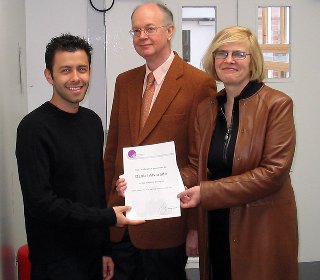What makes the best learning experience for you?
Daniel Alvarado, 3rd year Economics undergraduate, Kingston University
An old but effective teaching strategy to encourage critical thinking is the Socratic (or Maieutic) Method, which is focused on the teacher probing questions instead of shelling out answers. Students are induced to formulate latent concepts through a logical series of questions. A class in economics will include the study of abstract theoretical concepts that require the student to use his or her critical thinking skills. This method will help the student clarify his or her logical reasoning behind economic concepts and will better apply them to different economic situations. I enjoy this type of teaching tactic because it keeps the other students and I engaged in the subject.
However, in order for the method to work, a well trained instructor is needed. Teachers need to know how to direct the discussion, select constructive answers, and periodically summarize what has been learned. A major issue for students, in any subject, is that teachers often present the subject matter in a dull, monotonous, and/or stale manner. The teacher may have used PowerPoint to add visuals to the lecture, but the software program lacks in personality. The responsibility of the teacher to educate effectively lies in the enthusiasm, charisma, and/or sheer interest when he or she delivers a presentation. I would advocate for a program to teach the teachers how to teach.
I have found that the more contact I have with the professor, the more I am able to learn. Total classroom lecture hours in the United Kingdom are shorter compared to the United States. In an eleven week semester in the UK, one average economic class requires about 27.5 hours of direct contact with a professor. In a ten week quarter in the US, the same class requires about 48 hours of direct contact with a professor. That is, students in the US spend 74.5 percent more time with a professor than students in the UK. Although the United States takes a different approach to university education, the amount of direct contact with the instructor significantly impacts the amount of information a student is able to obtain.
Teachers should draw from current sources, such as academic journals or the news, to explain economic concepts. An article in the Financial Times could draw information from the Bank of England and report a change in the economy that can spur business to respond in particular ways. An annual report of a multinational corporation could be discussed to figure out why the business decided to stop production of a particular product. Both macro and micro economics could be taught from an article or report such as these. Current data makes the economic concepts relevant and useful, which is more intellectually satisfying than learning about disproved or outdated economic concepts that can be perceived as being irrelevant and useless.
Since economics studies the behavior of social systems—such as markets, business, parliament, and families—economic students need to better understand what effects policies may have on each system. I have found that using programs that simulate the economy are great tools for learning because they can, in educational sense, forecast what might happen in the future. With the program, I am able to observe the effects of several economic policies at one time.
Human behavior plays an important role in economics because it identifies the motivations behind many economic endeavors. When teachers lecture on human behavior, I better understand the role of the human psyche, motivation, incentives, and deviance. The main idea is that rational economic decisions vary from rational human decisions. The study of economics observes the allocation of scarce resources then tries to find ways to maximize benefits and minimize waste. A more comprehensive analysis of human behavior would prove to be very useful in explaining how humans allocate these scare resources (in the real world) and how the allocation might counter fundamental economic theories.
One essay at the end of the semester can not possibly cover all that should be learned in an economics class. If students learn how to pass the essay or final exam, then they do not have to bother learning anything else. It sometimes becomes commonplace for students to take the path of least resistance. I believe that it would behoove the students to have small periodic assignments throughout the class to refresh what has been learned and reinforce newly learned concepts.
In summary, what makes the best learning experience for me is when the professor includes me in the discussion and challenges me to think critically. I respond better to the subject when the professor is well rehearsed, presents effectively, and is lively. When the subject matter is current, it helps me to better associate the concepts with the real world. The more contact I have with professors, the more I learn. An emphasis on technology, through simulations, prepares me better for the future. A more complete understanding of human behavior allows me to better understand society. And finally, periodic assignments strengthen my ability to retain the newly acquired information.
 Daniel Alvarado receives his award from Inna Pomorina of the Economics Network along with Vincent Daly, the Head of School at Kingston.
Daniel Alvarado receives his award from Inna Pomorina of the Economics Network along with Vincent Daly, the Head of School at Kingston.
Read more student opinions in our national surveys of economics students.

